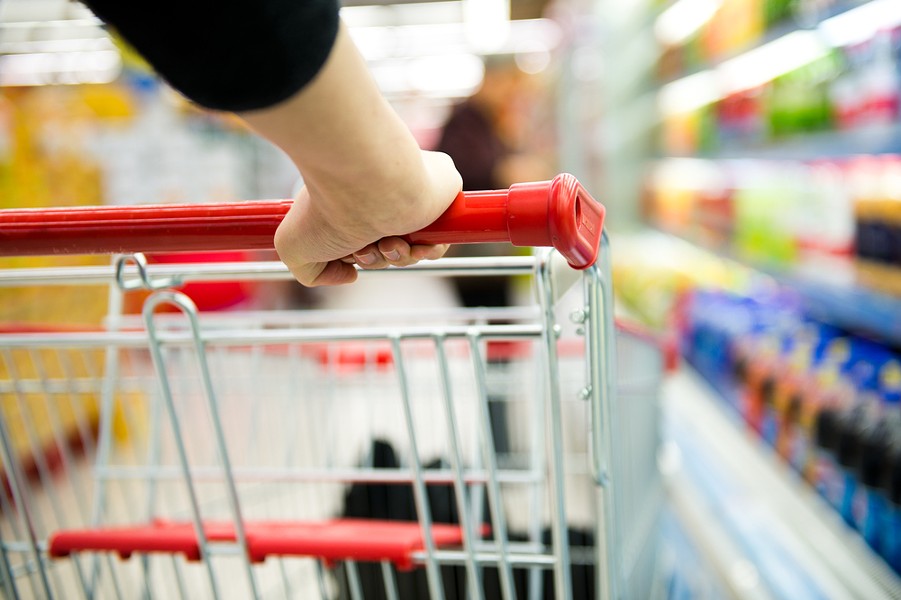Grocery stores and pharmacies throughout Humboldt County began to adjust to being on the front lines of efforts to limit the spread of COVID-19 this week.
Many have reduced hours to allow for extensive restocking and the thorough cleaning of surfaces, and some are offering special shopping hours for vulnerable populations, like those over the age of 65 or who have underlying health issues, shortly after they open while the store is freshly disinfected. Some have even started limiting entry to a certain number of people at any given time to allow for more social distancing, while others have taped aisle floors to leave visual cues of what the required 6 feet of personal space looks like.
New Store Hours
Walmart will close its Eureka store at 8:30 p.m. nightly to allow for additional cleaning and will offer a special shopping hour for seniors and other vulnerable residents from 7 a.m. to 8 p.m. on Tuesdays.
Target, which will now be closing daily at 9 p.m., will hold a daily shopping hour for seniors and people with compromised immune systems from 8 to 9 a.m.
Safeway, which is now closing stores daily at 9 p.m., will hold special shopping hours on Tuesdays and Thursdays from 6 to 9 a.m.
Costco is offering special shopping hours for vulnerable populations from 8 to 9 a.m. on Tuesdays and Thursdays.
The North Coast Co-Op and Eureka Natural Foods have both designated special senior shopping hours at all their locations daily from 7 to 9 a.m.
Winco has cut back its normal 24/7 schedule and now has the night shift stocking and cleaning, with the store open daily from 7 a.m. to 10 p.m. Additionally, it will hold special shopping hours for those over the age of 60 from 6 to 7:30 a.m. on Tuesdays and Thursdays.
Wildberries, meanwhile, is opening solely for senior shoppers daily from 6 to 7 a.m. and offering a 10-percent discount.
Shopping Safely
Because COVID-19 is a new disease, there is still uncertainty about how it spreads. But some studies have shown it can live on some surfaces for up to three days, which leaves people understandably anxious about touching everything from playground equipment to door handles. And that includes shopping carts, baskets and even some of those essential items folks need to take home from the grocery store. Bettina Fries, the chief of the Division of Infectious Diseases in the Department of Medicine at Stony Brook University School of Medicine, offered the Washington Post the following tips on how to shop safely.
• Do not panic. There's no need to stock up and hoard groceries, as grocery stores will remain open during shelter-in-place orders and there have been no major disruptions in supply chains.
• Wash your hands with soap and water for 20 seconds before and after shopping.
• Touch as little as possible while you shop to help avoid picking up or shedding the virus. Also avoid touching your face while shopping.
• Keep at least 6 feet from other shoppers and employees.
• If you are in an at-risk group, try to have someone else shop for you. If you can't do this, take advantage of the special hours stores are designating for vulnerable populations.
• Only go to the grocery store if you feel healthy enough to do so.
• Wipe down carts with disinfectant wipes provided by the store or bring your own. You can also use the wipes to open freezer and cooler doors.
• The CDC isn't recommending people wear gloves or masks; neither is necessary, Fries told the Washington Post.
The Food and Drug Administration recommends using the usual best practices for health and safety rules for handling food. FDA Commissioner Stephen Hahn said in a Feb. 27 statement that, "(The FDA) isn't aware of any reports at this time of human illnesses that suggest COVID-19 can be transmitted by food or food packaging." But the FDA recommends washing your hands after you've put groceries away, and those inclined can wipe down nonporous packaging — like glass jars and cans — with disinfectant. But no matter what you do, wash your hands.
If you are using a grocery delivery service, Consumer Reports suggests arranging for packages to be left at your door or on your front porch to avoid a direct hand-off. Further, if you're having other items delivered to your house via online purchases, the best practice is to wash your hands immediately after handling them.
In short, avoid touching your face after handling anything from outside your home and wash your hands frequently. And repeatedly.




Comments